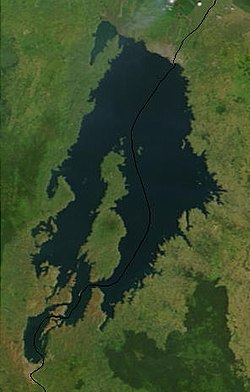Lake Kivu
| Lake Kivu | |
|---|---|

Satellite image of Lake Kivu courtesy of NASA.
|
|
| Coordinates | 2°0′S 29°0′E / 2.000°S 29.000°ECoordinates: 2°0′S 29°0′E / 2.000°S 29.000°E |
| Type | Rift Valley lakes, Meromictic |
| Primary outflows | Ruzizi River |
| Catchment area | 2,700 km2 (1,000 sq mi) |
| Basin countries | Rwanda, Democratic Republic of the Congo |
| Max. length | 89 km (55 mi) |
| Max. width | 48 km (30 mi) |
| Surface area | 2,700 km2 (1,040 sq mi) |
| Average depth | 240 m (787 ft) |
| Max. depth | 480 m (1,575 ft) |
| Water volume | 500 km3 (120 cu mi) |
| Surface elevation | 1,460 m (4,790 ft) |
| Islands | Idjwi |
| Settlements |
Goma, Congo Bukavu, Congo Kibuye, Rwanda Cyangugu, Rwanda |
Lake Kivu is one of the African Great Lakes. It lies on the border between the Democratic Republic of the Congo and Rwanda, and is in the Albertine Rift, the western branch of the East African Rift. Lake Kivu empties into the Ruzizi River, which flows southwards into Lake Tanganyika.
The lake covers a total surface area of some 2,700 km2 (1,040 sq mi) and stands at a height of 1,460 metres (4,790 ft) above sea level. Some 1 370 km2 or 58 percent of the lake's waters lie within DRC borders. The lake bed sits upon a rift valley that is slowly being pulled apart, causing volcanic activity in the area, and making it particularly deep: its maximum depth of 480 m (1,575 ft) is ranked eighteenth in the world.
The world's tenth-largest inland island, Idjwi, lies in Lake Kivu, as does the tiny island of Tshegera, which also lies within the boundaries of Virunga National Park; while settlements on its shore include Bukavu, Kabare, Kalehe, Sake, and Goma in Congo, and Gisenyi, Kibuye, and Cyangugu in Rwanda.
Lake Kivu is a fresh water lake and, along with Cameroonian Lake Nyos and Lake Monoun, is one of three that undergo limnic eruptions. Around the lake, geologists found evidence of massive biological extinctions about every thousand years, presumably caused by outgassing events. The trigger for lake overturns is unknown in Lake Kivu's case, but volcanic activity is suspected. The gaseous chemical composition of exploding lakes is unique to each lake. In Lake Kivu's case, methane and carbon dioxide due to lake water interaction with a volcano.
...
Wikipedia
